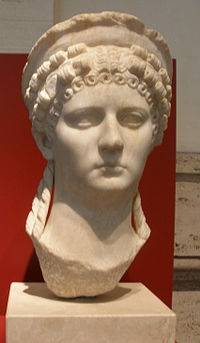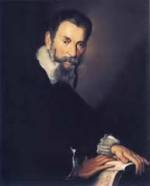Although by the time it was written in the mid-17th century, Shakespeare had been churning out histories for more than a decade, The Coronation of Poppea is the first opera that took real events as its basis. In fact, despite being one of the oldest surviving operas, the plot synopsis reads more like an episode from any number of currently popular political television shows. No wonder the librettist Busenello felt the need to include a disclaimer that he “represent[s] these actions differently”; in line with the best operas, Poppea promises lust, manipulation, attempted murder, betrayal, revenge, passion, and political ambition.
The opera’s plot vaguely resembles the last decade of Emperor Nero’s life, when he exiles his first wife and marries his favorite mistress after exiling her husband. Just that sentence alone would keep Frank Underwood busy for a season, but in Poppea we also hear from the cast-off spouses and we see just exactly how the gods tangle up the threads of this morally-ambiguous tapestry.
 Director of the Lyric Theatre, Julie Gunn, describes these immortal beings as “watch[ing] the events unfold as if they are on television.” It’s actually streaming on-demand, because it’s a story being told by Cupid, the god of Love, to prove that he is more powerful than either the goddess of Fortune or Virtue. For those of us who mentally went back to toga-times the moment gods were mentioned, consider that Gunn describes them as “glamorous, with a rock-star vibe”, and the director Madeline Sayet likens them to “bored, powerful teenagers whose major source of entertainment is manipulating the lives of mortals and abusing each other.” Sounds like a typical night on the CW to me. Additionally, the setting has been changed to a futuristic, dystopian Rome, rather than calling back to the original Nero.
Director of the Lyric Theatre, Julie Gunn, describes these immortal beings as “watch[ing] the events unfold as if they are on television.” It’s actually streaming on-demand, because it’s a story being told by Cupid, the god of Love, to prove that he is more powerful than either the goddess of Fortune or Virtue. For those of us who mentally went back to toga-times the moment gods were mentioned, consider that Gunn describes them as “glamorous, with a rock-star vibe”, and the director Madeline Sayet likens them to “bored, powerful teenagers whose major source of entertainment is manipulating the lives of mortals and abusing each other.” Sounds like a typical night on the CW to me. Additionally, the setting has been changed to a futuristic, dystopian Rome, rather than calling back to the original Nero.
The two women’s comments reinforced my perception that this is not going to be your typical big-dress/stuffed-shirt opera. More inside sources informed me that this particular production will be featuring new technology as a result of a grant project and both ancient and modern instruments. All of this blending of new and old was further reflected in the choice of Sayet as director. Currently operating from New York, Madeline Sayet’s directing career focuses on reimagined classics, slanting them with new perspectives and dealing with some of their problematic aspects. For example, her recent production of The Magic Flute worked from a new translation, was staged from her Mohegan background, and sought to give Tamino more motivation and appeal than “he’s a prince.” While the source materia of Poppea already seems to be in tune with our times, having her vision behind this version of the play will certainly ensure its relevance to our audience.
Not being one to miss a chance to chat with someone interesting and influential, I was able to email Ms. Sayet a few questions about Poppea.
SP: KCPA’s publicity tells me that this production of Poppea is offering a unique blend of ancient and modern instrumentation and staging. What can you tell me about that?

 Madeline Sayet: In my experience, artistic collaborations are at their best when the entire team is in a place of asking questions. Knowing that Monteverdi and Busenello were innovating in their time, and that we have permission to do the same with this production today is incredibly liberating. It means that we get to explore, in a really hands-on way, the best solution to each problem, instead of just reusing someone else’s old solution. I have set the story in a Dystopian Rome, rather than Ancient Rome or the present day, to give us freedom to play with this marriage of past and future.
Madeline Sayet: In my experience, artistic collaborations are at their best when the entire team is in a place of asking questions. Knowing that Monteverdi and Busenello were innovating in their time, and that we have permission to do the same with this production today is incredibly liberating. It means that we get to explore, in a really hands-on way, the best solution to each problem, instead of just reusing someone else’s old solution. I have set the story in a Dystopian Rome, rather than Ancient Rome or the present day, to give us freedom to play with this marriage of past and future.
SP: Some old dead white critics have called Poppea amoral, seeing the protagonist’s affair and ambition negatively. While affairs and political angling are commonplace and acceptable now, did you find the script problematic as a woman with a different cultural background? Were you able to adapt those issues in some way?
Sayet: I actually think the original script is fairly forward thinking in that it deals out complex morality to everyone. No one is merely bad or good. That is what was “problematic” about this opera, back in the 1600s. Those following a standard path don’t automatically reap a reward. Nowadays that’s something we just understand as the truth. People make complex decisions, and ultimately Virtue is out of fashion. Being good does not lead to infinite wealth. It isn’t actually getting people where they want to be in life. So, it is frequently forsaken. While, that is sad, it is still true. Everyday in the world we live in, people do terrible things for their own gain.
For me, what is problematic is the amount of influence the gods have on everyone. The thing I have come up against, again and again, is wanting to give a character agency but realizing how strongly these impulses — Love, Fortune, Virtue — really do compel people. Then and now. We all experience it: whether we give up dating for the sake of Virtue, make an ethical compromise for the sake of Fortune, or lose our minds over our Love for someone. It is real. That is what people do. People act crazy after Cupid’s arrows hit them. Poppea leaves Ottone, but we quickly learn Ottone has another lover anyway. So what makes Poppea the immoral one?
I am not particularly invested in binaries, ideologically; so the complex morality of Poppea is a good fit for me. What are the complex webs into which we weave ourselves? I am interested in systems of understanding— how everything we build into a world effects everything else.
SP: For a casual listener, the word “opera” may bring to mind Mozart, Wagner, perhaps even Verdi. Since Montverdi transitioned between the Renaissance and Baroque eras, more than a century before those other guys, how would you describe his sound as compared to some of the operas we know well enough to hum?
Sayet: It feels more like the songs that appear onstage in a Jacobean playhouse than the huge swells and shifts of the operas you mention. But, I am a Shakespearean by trade, so when working in the original italian I have enjoyed the marriage of music and poetry. The music is beautiful, but it was evolving out of a time when the story and poetry were the sole driving forces.
SP: Did these musical differences present any challenges or opportunities?
Sayet: So how do we keep our minds open to the entire story? Even for Monteverdi and Busenello, it was an adaptation. They messed with the order of historical events in order to tell a specific story, relevant for their time.
What is it about that story that still resonates with us today? How can we create the intimacy of a small performance space in our larger theaters?
My biggest questions working on this piece are: what can we take with us of Monteverde’s spirit of innovation?
Instead of just staging a scene generated by what’s in my mind when I listen to the music, I’d rather weave something spectacular out of the experiences of everyone in the room. I want to create a world that offers everyone viewing it a kaleidoscopic lens on their own reality.
SP: What else would you like a potential audience member to know about the production?
Sayet: Not long ago, I was not an opera fan. I didn’t think it was a space in which I was allowed, neither as an audience member nor as a creative – it felt exclusive and alien. When this opera was created those ideas of opera as a form reserved for the elite hadn’t been created yet. I want to bring back a sense of opera for the people. Not dumbing it down, but rather, asking what this story means to human beings in this very moment. If a story is not in some way vital, we should be telling a different one. I cannot tell a story without a clear WHY. It needs to mean something to me. My hope for everyone coming to see Poppea is that these complex, messy, human characters appear “amoral” because they are flawed like every single one of us. I hope you leave with a moment that makes you see the world just a little bit differently.
—
The Lyric Theatre @ Illnois will present Poppea for one weekend only, opening Thursday, November 10th at 7:30 p.m. with evening shows through Saturday, November 12th. Sunday, November 13th will have a 3 p.m. matinee. Tickets start at $35, but there is a significant discount for purchasing a package of the three operas for the season. Purchases can be made online or by calling the ticket office at 1-800-KCPA-TIX.








